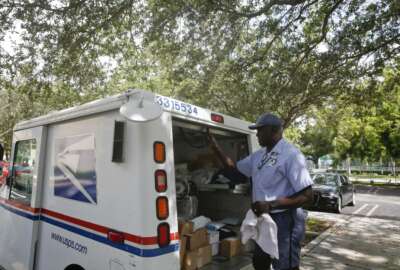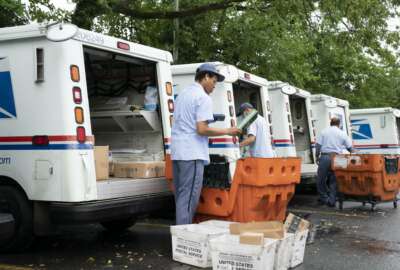USPS unions, top House Democrat back bill setting harsher sentences for robbing letter carriers
More than 2,000 robberies or attempted robberies of letter carriers that have happened since 2020.
Ryan Pierani remembers getting robbed when he used to deliver pizzas. But he never expected to be robbed on the job while delivering mail and packages, as a letter carrier for the Postal Service.
“When you carry cash on you, you always expect to be robbed,” Pierani, now a letter carrier in Cincinnati, Ohio, said in an interview Wednesday. “You have to be on high alert, and it happens here and there.”
But Pierani wasn’t on guard, when a young man approached his USPS-marked delivery van in January 2022. He was eating his lunch inside the van, when he heard a jiggling coming from the sliding side door.
“I looked in my mirror, I saw a kid. I didn’t think anything of it,” Pierani said. “Well, the guy came up my side, stuck a gun to my head, and that’s how it went.”
Some things have changed. Pierani said he now carries a canister of mace when making deliveries. But the shock of what happened more than two years ago stays with him — especially when he drives by the spot where he got robbed, every day, on his route.
“You’re going to think about it every time. Every day it goes through your head. And you just deal with it however you can deal with it. Being a letter carrier, you used to be able to walk down the toughest streets in America, not even a word,” Pierani said. “Nothing except, ‘Hello, Mr. Mailman.’ And now you can’t.”
Pierani’s account is one of 2,000 robberies or attempted robberies of letter carriers that have happened since 2020.
“You never, ever expect to be robbed, being a postal worker,” told the crowd at a rally on Capitol Hill, organized by the National Association of Letter Carriers.
NALC National President Brian Renfroe said 643 letter carriers were attacked on the job in 2023 — a 30% increase in incidents, compared to the year prior. A majority of these attacks involve a gun or some other type of weapon.
“This leaves our members shaken and fearful to do their job,” Renfroe said.
Renfroe said a letter carrier in Philadelphia was recently maced by an assailant, who then stole his keys from his mail satchel.
“That was the second time he’s been attacked,” Renfroe said. “Targeted robberies, assaults and even murder have become part of our job.”
In 2022, in Milwaukee, Wisconsin, a letter carrier named Aundre Cross was murdered by two assailants after he tried to run away from an attempted robbery.
“We can never let this type of violence happen again,” Renfroe said.
Criminals are robbing letter carriers for their arrow keys, which open blue collection boxes, to steal mail and packages, as well as commit financial crimes — including altering checks and committing check fraud.
Matt McBee, a letter carrier from Detroit, Michigan, said two young men in ski masks, one holding an AK-47, stole his arrow key in July 2023.
“They stuck it to my head. All they wanted was the key,” McBee said.
USPS, since May 2023, has installed more than 15,000 high-security blue collect boxes across the country, which are expected to be a harder target for criminals to exploit. It’s ordered an additional 8,500 “hardened” blue boxes.
The agency has also installed 28,000 electronic locks on blue collection boxes across the country — which require more than just an arrow key to open.
McBee, who’s experienced symptoms of post-traumatic stress disorder since the armed robbery, said he hopes USPS will make these upgrades quickly, so that he and other letter carriers don’t have to carry around the keys that criminals keep targeting.
“It’s essentially like a piece of steak in our pocket in a lions’ den,” McBee said. “If that’s what everybody wants, we’ve got to get rid of that.”
NALC and the other postal unions are calling on Congress to pass the Protect Our Letter Carriers Act, a bill Reps. Brian Fitzpatrick (R-Pa.) and Greg Landsman (D-Ohio) introduced Wednesday.
The bill, if passed, would give USPS $1.4 billion annually from fiscal 2025 through 2029 to install more high-security blue collection boxes, and replace the universal mail key, also known as an “arrow key,” with electronic versions.
“We need them all over the country and the resources to make sure it happens quickly,” Landsman said.
Letter carriers “do so much for us,” he said. “The least we can do is make sure that every single one of them is safe.”
The bill would also require the Justice Department to designate an assistant U.S. attorney at all 93 U.S. Attorney’s offices across the country to supervise the investigation and prosecution of crimes committed against letter carriers.
The bill also amends federal sentencing guidelines to treat the assault of a postal worker with the same severity as assaulting a police officer.
“There are certain sentencing enhancements. If you’re in a position of public trust, that’s a bump up on the sentencing guidelines. If you commit a crime with a firearm, that’s a bump up. This is a sentencing enhancement, protecting this classification of workers, that requires a judge to enhance the sentence, beyond what the underlying statute says,” Fitzpatrick said.
Renfroe said NALC is “pushing for a sentence that is a strong enough service that would deter these crimes from happening.”
“We have, unfortunately, had instances of what I deem as absolutely absurd sentencing for violent crime,” Renfroe said.
Pierani, the letter carrier from Cincinnati, said he expects letter carriers will be safer on their routes, if Congress passes the bill.
“We just need everybody in the nation to rally behind that. If we can make that happen, then we’re good to go,” he said.
McBee, the carrier from Detroit, said the legislation would help “not only catch these criminals that are treating us like this, but prosecute them to the fullest extent of the law.”
“That’s why it keeps happening — because they know they’re not going to get caught,” McBee said. “I can emphasize enough, for all the politicians that are listening, how important it is to pass these laws. We’ve got to get stricter laws.”
House Minority Leader Hakeem Jeffries (D-N.Y.) said he supports the bill.
“We’re going to end the workplace violence that you have been forced to endure and make it clear, once and for all, that enough is enough,” Jeffries said. “The assaults against letter carriers are unacceptable. The robberies directed at letter carriers are unacceptable. The level of violence that is directed at letter carriers … is unacceptable. And it’s time for Congress to act and to do something about it.”
Rep. Steny Hoyer (D-Md.) said criminals who target letter carriers “deserve the maximum penalty.”
“If you attack a widow’s ability to get a Social Security check, that’s an attack on America. If you attack somebody who’s getting their retirement check, that’s an attack on America,” Hoyer said. “If you attack them, you attack us as a country. That’s why that penalty ought to be greater.”
Fitzpatrick said he expects his bill to pass later this year — and that he anticipates getting the 290 cosponsors necessary to force a House floor vote, if necessary.
“This is a no-brainer. I can’t imagine anybody being opposed to it, which means that I fully expect this to come on the floor this year and pass with overwhelming support,” Fitzpatrick said.
Renfroe said prosecution rates have improved slightly, “and more frequently the people that commit these crimes are being held accountable.”
“Make no mistake, we have a long way to go,” Renfroe said.
AFL-CIO Secretary-Treasurer Fred Redmond said the labor organization, which represents 60 national unions, supports the legislation.
“Every worker in this country has a right to go to work safely and return home to their families safely. That’s a fundamental union principle that we all stand for,” Redmond said. “This is an issue of common decency, to protect workers — and to those who assault those workers, make sure that they receive the maximum punishment,” Redmond said.
Copyright © 2025 Federal News Network. All rights reserved. This website is not intended for users located within the European Economic Area.
Jory Heckman is a reporter at Federal News Network covering U.S. Postal Service, IRS, big data and technology issues.
Follow @jheckmanWFED






